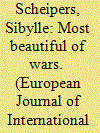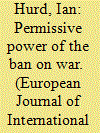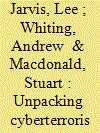|
|
|
Sort Order |
|
|
|
Items / Page
|
|
|
|
|
|
|
| Srl | Item |
| 1 |
ID:
151573


|
|
|
|
|
| Summary/Abstract |
The article examines when and how often great powers are likely to follow a grand strategy of restraint and whether there is any evidence that they have ever done so. The question has considerable implications for the ongoing US grand strategy debate. Restraint refers to the practice of self-discipline in the use of force for self-defence or for addressing massive power imbalances; and in extending security commitments to foreign political actors. The first part of the article examines statistics in the last two hundred years on great power involvement in wars and disputes as well as on their commitments to alliances and dependencies. The second part considers whether two seeming cases of the dominant power scaling down its international involvement – Ming China withdrawal from naval mastery in the fifteenth century and Victorian Britain splendid isolation – represent instances of genuine restraint.
|
|
|
|
|
|
|
|
|
|
|
|
|
|
|
|
| 2 |
ID:
151570


|
|
|
|
|
| Summary/Abstract |
Carl von Clausewitz was both an avid analyst of small wars and people’s war and, during the wars of liberation, a practitioner of small war. While Clausewitz scholars have increasingly recognised the centrality of small wars for Clausewitz’s thought, the sources and inspirations of his writings on small wars have remained understudied. This article contextualises Clausewitz’s thought on small wars and people’s war in the tradition of German philosophical and aesthetic discourses around 1800. It shows how Clausewitz developed core concepts such as the integration of passion and reason and the idea of war in its ‘absolute perfection’ as a regulative ideal in the framework of his works on small wars and people’s war. Contextualising Clausewitz inevitably distances him from the twenty-first-century strategic context, but, as this article shows, it can help us to ask pertinent questions about the configuration of society, the armed forces and the government in today’s Western states.
|
|
|
|
|
|
|
|
|
|
|
|
|
|
|
|
| 3 |
ID:
151569


|
|
|
|
|
| Summary/Abstract |
In securitisation theory (ST) little attention has been paid to how actors undertake securitisation collectively. The empirical focus of that theory has also, paradoxically, neglected the military-strategic sector and with it regional security organisations like NATO. Such an oversight is worth correcting for three reasons. First, NATO is constantly engaged in securitisation across a range of issues, a process that reflects an underappreciated recursive interaction between the Alliance and its member states. Second, the Ukraine crisis has resulted in Russia being explicitly identified as a source of threat and so has triggered a successful collective (re)securitisation by the Alliance. Third, a framework that demonstrates NATO’s standing as a securitising actor has potential relevance to other regional security organisations. This article discusses and amends ST in service of an approach that permits securitisation by actors other than the state, in this case NATO. A model of collective securitisation is presented and then applied empirically to the post-Cold War desecuritisation of Russia and its subsequent resecuritisation following the annexation of Crimea. The implications of resecuritisation for the emergence of a self-reinforcing security dilemma in NATO-Russia relations are also considered.
|
|
|
|
|
|
|
|
|
|
|
|
|
|
|
|
| 4 |
ID:
151572


|
|
|
|
|
| Summary/Abstract |
Drawing on a notable example of a non-Western normative initiative, Brazil’s ‘Responsibility while Protecting’ (RwP), this article contributes to broadening the scope of the norm dynamics literature beyond its common Western-centric focus. Post-2011 Libya intervention, Brazil proposed RwP to clarify what ‘using force’ means under the Responsibility to Protect (R2P) banner, but then withdrew from visible norm sponsorship, only to return to this as part of a collective exercise to institutionalise R2P at the United Nations. First, the article highlights the significant role of non-Western agents whose contributions usually go overlooked, yet carry the highest potential to address the legitimacy deficit of norms like R2P. Second, the article proposes adding a new conceptual tool when investigating the role of agency in norm dynamics, one that incorporates a wider range of norm ‘shaping’ processes and highlights enabling, contingent circumstances. The latter, is argued, best captures the anomalies in contemporary norm contestation. This is illustrated through an empirical analysis of the conditions under which Brazil was able to advance RwP, despite the subsequent emergence of unfavourable circumstances. This article emphasises how significant an alignment of enabling circumstances is to non-Western agents in terms of shaping norm contestation and normative exercise completion.
|
|
|
|
|
|
|
|
|
|
|
|
|
|
|
|
| 5 |
ID:
151568


|
|
|
|
|
| Summary/Abstract |
The ban on inter-state war in the UN Charter is widely identified as central to the modern international order–Michael Byers calls it ‘one of the twentieth century’s greatest achievements’. Even if it is only imperfectly observed, it is often seen as a constraint on state autonomy and an improvement on the pre-legal, unregulated world before 1945. In response to this conventional view, this article shows that the laws on war in the Charter are better seen as permissive rather than constraining. I make two points. First, by creating a legal category around ‘self-defence’, the laws on war authorise, and thus legitimate, wars that are motivated by the security needs of the state, while forbidding other motives for wars. Second, state practice since 1945 has expanded the scope of this authorisation, extending it in both time and space beyond the black-letter text of the Charter. The permissive effect of law on war has therefore been getting larger. These two effects suggest that international law is a resource that increases state power, at least for powerful states, and this relation between international law and power politics is missed by both realists and liberal internationalists.
|
|
|
|
|
|
|
|
|
|
|
|
|
|
|
|
| 6 |
ID:
151571


|
|
|
|
|
| Summary/Abstract |
This article explores original empirical findings from a research project investigating representations of cyberterrorism in the international news media. Drawing on a sample of 535 items published by 31 outlets between 2008 and 2013, it focuses on four questions. First, how individuated a presence is cyberterrorism given within news media coverage? Second, how significant a threat is cyberterrorism deemed to pose? Third, how is the identity of ‘cyberterrorists’ portrayed? And, fourth, who or what is identified as the referent – that which is threatened – within this coverage? The article argues that constructions of specificity, status, and scale play an important, yet hitherto under-explored, role within articulations of concern about the threat posed by cyberterrorism. Moreover, unpacking news coverage of cyberterrorism in this way leads to a more variegated picture than that of the vague and hyperbolic media discourse often identified by critics. The article concludes by pointing to several promising future research agendas to build on this work.
|
|
|
|
|
|
|
|
|
|
|
|
|
|
|
|
|
|
|
|
|